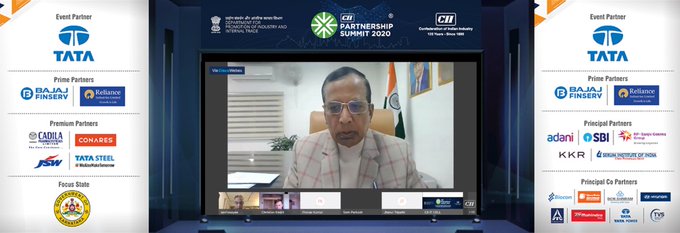“It is time to inject much needed life into the WTO” says Union Minister Som Parkash
New Delhi: International trade has become a casualty of Covid-19 with trade declining sharply and complex value chains being negatively impacted, noted Sri Som Parkash, the Minister of Stare for Commerce and Industry, Government of India. He was addressing a session on “Resetting the Multilateral Trading Order”, organised at the 26th Partnership Summit of the Confederation of Indian Industry and Department for Promotion of Industry and Internal Trade, Ministry of Commerce and Industry, Government of India.
“Covid-19’s worst impact has been on G-20 countries and the crisis requires a good multilateral policy response for recovery to take place in 2021,” the minister added. He observed that the trade liberalisation, technical assistance, and south – south cooperation that the World Trade Organisation (WTO) has enabled are extremely important and the institution must ensure that members do not resort to protectionism in these trying times.
H E Ms Iselin Nybø, Minister for Trade & Industry, Norway, noted that globalisation has not been equally beneficial to all and that there is need for economic restructuring post-pandemic. She emphasised that Norway benefits greatly from international trade given its geographic position. She asserted that the global community must stand together for a well-functioning multilateral trading system for open, fair, and free trade and investment.
Mrs. Hanneke Schuiling, Director General, Foreign Economic Relations, Ministry of Foreign Affairs, the Netherlands, contended that resetting the multilateral trading order starts with reforming the WTO. She added that there was a widespread lack of compliance with transparency and stronger commitments were required on the same. She also supported the need to devise a new approach to the Special and Differential Treatment Principle and making serious work of reforming the Dispute Settlement Mechanism. Trade, she concluded, would be most important to have economic growth post Covid-19, with a focus on digital, green, and social transition.
Mrs Drothy Tembo, Deputy Executive Director, International Trade Centre, Geneva, highlighted four important ideas for resetting the multilateral order – addressing contemporary challenges and planning for future reoccurrences (like the pandemic), action on climate change, greater transparency and predictability in trade rules, and SMEs being at the centre of policy making for the recovery process.
Dr Robert B. Koopman, Chief Economist and Director of the Economic Research and Statistics Division Chief Economist, WTO, Switzerland, noted that WTO rules on trade restrictions require that they be targeted, transparent, and temporary, and most countries have stuck to these principles even for pandemic related restrictions. Apart from FTAs, 80% of international trade still happens at WTO levels, he added. This is not a period of de-globalisation but rather stabilisation and we can expect a reorganisation of globalisation.
Mr Christian Ewert, CEO, amfori, Brussels, stated that there were four immediate issues being faced by economies – supply chain disruptions, job loss, slow economic recovery, and ensuring sustainable trade.
Dr Heungchong Kim, President, Korea Institute for International Economic Policy, Republic of Korea, emphasised four important areas of reform – the negotiation function of the WTO by allowing for the multilateralization of plurilateral agreements, the restoration of the Dispute Settlement Body, checking effective compliance with WTO rules through timely and quality notifications, and political resolve across the membership for necessary reform.
Mr R Seshasayee, Past President, CII and Corporate Director & Advisor, Hinduja Group, observed that global trade has had a positive development impact over time, especially in South and South – East Asia. While global trade has led to increased inequality within and amongst nations, there still remains faith in the multilateral trading order to address these issues, he asserted.

